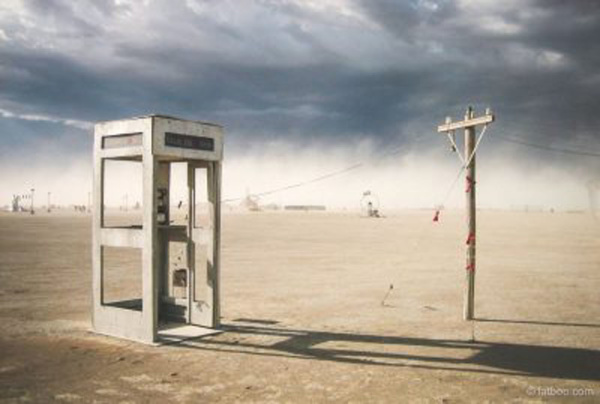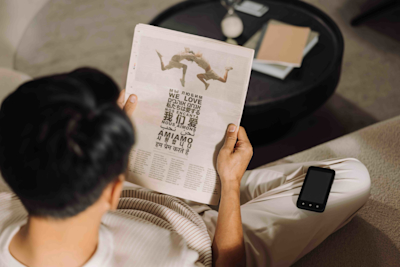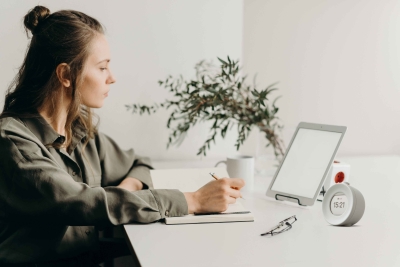
First Five Steps to Becoming a Digital Minimalist
Guest author Anastasia Dedyukhina is the founder of Consciously Digital™, TEDx speaker, author of Homo Distractus book and a blogger at Huffington Post. Anastasia stopped using her smartphone and now focuses on coaching people on conscious use of digital technologies staying happy and productive.
Mudita’s team had the pleasure to attend one of Anastasia’s talks on the Digital Distractions. We learned how to coach our brains to stay focused in a digital era. Feel free to read our short summary of her talk: The lecture: Neuroscience of Digital Distractions
Here are my first five steps to becoming a digital minimalist:
The idea of digital minimalism is not to reduce how much time you spend online, but rather to focus on what really matters, and ignore all the rest (inevitably, this will reduce less useful time spent online). Holiday season might be just the best time to do that, as you have far less social pressure to catch up with all.
1. Don’t your carry device with you at all times.
Stop making yourself constantly available but do make sure people know in advance when you are available (relationship management).
Why: Mobile phones are a way for other people to impose their agenda on you and now in addition to other people, there are bots and internet companies that do the same and this will only increase. Either you are in charge of your time, or your device is. If you have it with you at all times, it’s likely the second option.
2. Accept the idea that someone will be unhappy and you may lose some opportunities…
…but what you gain instead, is an increased focused and more energy for a few things that matter.
A client, a busy business woman, was finally convinced to unplug for 48 hours, and was relieved to discover that the business kept running as it should, the team was able to cope with problems on its own. Now she is determined to make it a regular practice.
Why: Our attention is a limited resource. If we are paying attention to multiple things, we are taking away attention from what is truly important. We have to start making choices.
3. Before you look at your devices in the morning.
Write down on a piece of paper 2-3 things that will make a true difference if you do them. Stick the note to your monitor. Now switch your computer and start by focusing on what will make the most difference, not by checking everything else.
Why: Decision-making requires lots of attention, and self-control consumes lots of brain energy. When we are distracted and/or presented with exciting opportunities internet offers us all the time, we cannot take good decisions, less so control ourselves all the time.
4. Review, how many social media platforms you use.
Only keep those you truly enjoy using, or that you need for work. To determine it, try not logging into one for one week. Did work or relationships suffer? If nothing changed, you can probably easily live without it. Or log into it a couple of times per month.
Why: Just managing all of them requires lots of attention to you. Every notification you receive schedules a little time in your brain to act upon it (check, reply, like etc). It might be small, but they accumulate quickly.
5. Don’t open multiple tabs at once.
One task, 1-2 tabs max. When done, take a break and switch to a different task.
Why: I wrote multiple times that humans are not good at multitasking (proven by experiments in Stanford and other places). When we do that, we lose up to 40% of our productive time.
Bonus point: Revise all of your paid online subscriptions. It’s tiring, but find a couple of hours to make a list of all online services you use (Amazon, eBay, Netflix, Coursera etc) and revise if you have any ongoing subscriptions that you don’t use. One client discovered he could save up to 300 pounds per month when he finally got down to cancelling all subscriptions he was not using.
Click here to see the original article. If you also wold like to enhance your knowledge on a subject feel free to check Anastasia’s webinar.
Is there anything you’d like to add, have we missed anything? If you’re interested in sharing your experiences with us or writing a guest post for us, send us an email via hello@mudita.com!
Please feel free to get in touch via social media (send us some photos or videos too), you can find us on Facebook, Twitter and Instagram, let’s connect! To learn more about Mudita, take a look at our website and our other posts.
If you enjoyed reading this article, please share and recommend it!
Related stories

The Case for a Minimalist Phone in a Smartphone World
Mudita Kompakt is a minimalist phone designed for balance, focus, and mindful tech use. Break free from digital overload and embrace intentional living.

Simple Ways to Stop Getting Distracted
Learn simple ways to stop distractions with Mudita Kompakt and Mudita Harmony. Reclaim focus, reduce screen time, and live more intentionally with mindful tech.

Mindful Tech Use: Digital well-being for a balanced life
Discover the art of mindful tech use with actionable tips for digital well-being.
If you'd like to receive the best stories from our blog, keep up to date with our progress and get notified about our product releases and special discounts.